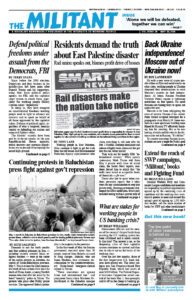Since the Feb. 3 Norfolk Southern derailment and controlled burn-off of five tankers that spewed 700,000 pounds of toxic vinyl chloride onto the soil, water and air in East Palestine, Ohio, in February, attention there and around the country has been focused on how to deal with the danger of more such disasters. Working people there are setting an example by fighting for information and some control over their lives.
Vinyl chloride is a highly volatile colorless gas produced by combining ethylene and chlorine. It is used to make polyvinyl chloride, known as PVC, widely used in plastic products.
The gas is a known carcinogen, linked to liver, brain and lung cancers, lymphoma and leukemia. It breaks down in the air forming hydrochloric acid, formaldehyde, and other chemicals.
More than 20 billion pounds of vinyl chloride are made each year by chemical companies along the Gulf Coast. The vinyl chloride hauled by Norfolk Southern came from the OxyVinyls plant in La Porte, Texas, near Houston, which is owned by Occidental Petroleum.
The New York Times reported April 17 that workers in La Porte and at another OxyVinyls plant nine miles away in Deer Park are discussing the dangers of toxic chemical production.
“You get headaches, you get nauseous and you get chronic respiratory issues that affect you. It could be a normal day, and all of a sudden there’s a siren that goes off,” Sema Hernandez, who lives a half mile from OxyVinyls in La Porte, told the Times, and we need “to shelter in place.”
Juan López, who supervises the cleaning of tanks that hold toxic chemicals at the Deer Park facility, said he comes home to find clouds of toxic chemicals floating over his house. While he wears protective gear at work, this isn’t realistic for his family, López told the Times.
In March, a five-hour “emission event” there released nearly 15,000 pounds of hydrogen chloride, a gas that irritates the eyes and throat.
Toxic wastewater from East Palestine has been trucked back to the processing plant in Deer Park. Vinyl chloride has also been found in the soil at Houston-area rail yards, where hazardous chemicals are shipped out, and in groundwater in Houston after Hurricane Harvey.
In a region of Louisiana between New Orleans and Baton Rouge, known as “cancer alley,” whole towns have been abandoned after massive pollution from vinyl chloride production by Dow Chemical and other companies.
Over the past decade, rail shipments of chemicals used in plastic production have risen by a third. The rail cars that derailed in East Palestine — and in Paulsboro, New Jersey, in 2012 — were on an over-1,000 mile journey from La Porte to a New Jersey plastics plant also owned by Occidental Petroleum.
Workers in these chemical plants, on the trains that transport them, and who live near them, have a big stake in the fight in East Palestine. This is part of the broader fight for workers and our unions, alongside area residents, to take control of production and transportation operations out of the hands of profit-driven bosses and run them in the interests of all working people.

